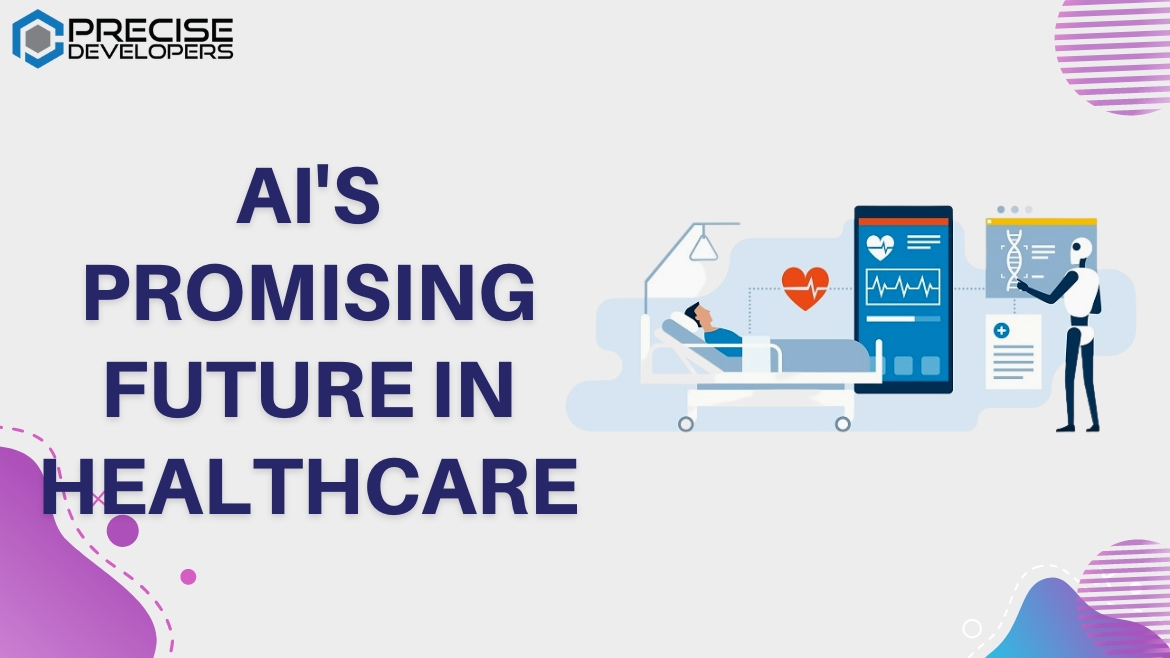AI’s Promising Future in Healthcare
Artificial Intelligence (AI) is transforming healthcare as we know it. It has the potential to improve outcomes, reduce costs, and increase access to care. The use of AI in healthcare is rapidly growing and is expected to continue to do so in the future. In this blog, we will explore the promising future of AI in healthcare and how it will impact the industry.
What is the future of AI in healthcare?
The future of AI in healthcare is bright. According to a report by Accenture, AI in healthcare is expected to grow at a compound annual rate of 41% from 2018 to 2025, reaching a market size of $6.6 billion. The use of AI in healthcare will become increasingly important in the coming years as the demand for healthcare services increases and the need to reduce costs intensifies.
How will AI improve healthcare?
AI holds the capacity to enhance healthcare in numerous aspects, presenting several significant advantages:
- Faster and more accurate diagnosis: AI can analyze vast amounts of medical data and identify patterns that humans may miss. This can lead to faster and more accurate diagnoses, which can improve patient outcomes.
- Personalized treatment plans: AI can analyze patient data to create personalized treatment plans based on a patient’s medical history, genetics, and lifestyle. As a result, this may bring about treatments that are more efficient and yield improved results.
- Improved efficiency: AI can automate many tasks, such as medical coding and billing, which can free up healthcare professionals to focus on patient care. Consequently, this may result in enhanced efficiency and decreased expenses.
How will AI change the future of the country in healthcare?
The use of AI in healthcare has the potential to improve healthcare outcomes and reduce costs, which can have a positive impact on the country as a whole. Improved healthcare outcomes can lead to a healthier population, which can lead to increased productivity and economic growth. Reduced healthcare costs can also free up resources that can be used for other important priorities, such as education and infrastructure.
What is the positive impact of AI in healthcare?
The positive impact of AI in healthcare is vast. Listed below are some notable advantages:
- Improved outcomes: AI can help healthcare professionals identify diseases earlier and develop personalized treatment plans, which can lead to improved outcomes for patients.
- Reduced costs: AI can automate many tasks, which can reduce costs and free up resources that can be used for other important priorities.
- Increased access to care: AI can help healthcare professionals reach more patients by providing remote consultations and automating many tasks, which can increase access to care for underserved populations.
What are 3 ways AI will change healthcare by 2030?
- Increased use of telemedicine: AI can enable remote consultations, which can increase access to care and reduce costs.
- Improved diagnostics: AI can analyze medical data and identify patterns that humans may miss, which can lead to faster and more accurate diagnoses.
- Personalized treatments: AI can analyze patient data to create personalized treatment plans based on a patient’s medical history, genetics, and lifestyle, which can lead to more effective treatments and better outcomes.
What is the role of AI in healthcare?
The role of AI in healthcare is to assist healthcare professionals in providing better care to patients. AI can analyze vast amounts of medical data, identify patterns, and create personalized treatment plans, which can improve outcomes and reduce costs. AI can also automate many tasks, which can free up healthcare professionals to focus on patient care. Ultimately, the role of AI in healthcare is to improve the quality of care that patients receive.
To sum up, AI has a bright future in healthcare. AI has the potential to improve outcomes, reduce costs, and increase access to care. The use of AI in healthcare will become increasingly important in the coming years as the demand for healthcare services continues to grow. AI has the ability to revolutionize the healthcare industry by improving efficiency, accuracy, and patient outcomes. As technology continues to develop, we can expect to see even more innovative applications of AI in healthcare. However, it is important to note that AI should not replace healthcare professionals, but rather assist them in providing better care to patients. It is crucial to continue to invest in the development and implementation of AI in healthcare to improve the overall quality of care for patients. With the right resources and guidance, AI has the potential to transform the healthcare industry for the better.
You may also like to see: Stay Safe in the Digital World: How DevOps Can Help
If you found this post informative, we encourage you to share it with your colleagues. We value your feedback and would love to hear your thoughts on our blog and social media posts across platforms such as Instagram, Facebook, LinkedIn, and Twitter.

